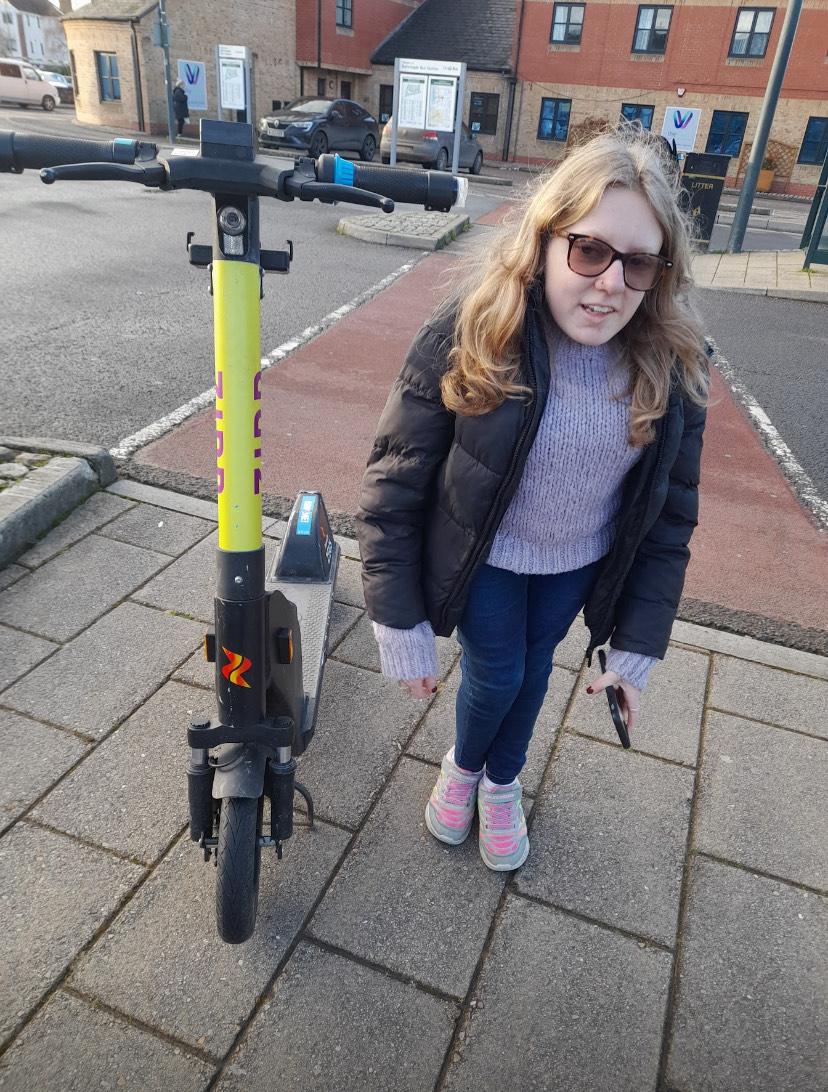
Ella with her electric scooter
A resident of Braunton, has been caught in a legal limbo due to her reliance on an electric scooter for mobility - but is breaking the law every time she has to use it.
Ella Wakley, 19, has SMDK, a form of dwarfism. Her limited mobility makes her dependent on her electric scooter to navigate daily life.
But electric scooters like Ella’s are currently illegal for use on public roads, leaving her vulnerable to prosecution and the risk of accumulating points on her licence each time she ventures outside.

Speaking on her concerns, Ella said: "I feel that there is a simple solution to the problem, and I have felt the government hasn’t listened to my need as a disabled person. The situation makes me anxious every time I leave the house on my scooter as I’m afraid I will get stopped. I need the scooter to get to work, take my dog for a walk, and it allows me to go further than I am able to walk.”
She explained: “If I didn’t have my electric scooter, I would struggle with everyday life as I can’t walk very far without being exhausted and in pain."
Despite her efforts to address the issue with local authorities and political representatives, including contacting her MP, Selaine Saxby and the Department of Transport, her plea for change has gone unanswered.
In response to enquiries by the Gazette, Selaine Saxby, MP for North Devon, expressed support for Ms Wakley's cause, stating: "It was wonderful to meet with Ella and her parents recently, and I wholly support her call to enable specially modified e-scooters to be classed as a mobility aid for those with Blue Badges."
Ms Saxby further emphasised the need for legislative changes, stating: "This would, however, require legislative changes to the Road Traffic Act and any changes to the law would require a significant consultative process."
Ms Saxby, disheartened by the lack of progress also said: "The response I have had so far has not been as positive as I would have hoped for. I have also contacted Devon County Council about the use of Blue Badges before 9.30am. Ella wants to go to college and to get a job, and she and other ambitious residents with disabilities will need to access public transport before 9.30 for both."
She echoed Ella’s concerns about accessibility and added: "If we are to encourage everyone who wants to work into work, we must do more and I do think that this is something we can change."
Ms Saxby highlighted the English National Concessionary Travel Scheme (ENCTS), which provides free off-peak bus travel to those with eligible disabilities and those aged 66 and over.
She noted: "Local Authorities like Devon County Council have the power to extend free bus travel outside of the statutory off-peak time; however, these additional concessions are not funded by central government."
Ms Saxby shared the need for broader accessibility measures, stating, "If we are to encourage everyone who wants to work into work, we must do more, and I do think that this is something we can change."
As part of her commitment to addressing these issues, Ms Saxby pledged to raise the matter on the Work and Pensions Select Committee as part of their inquiry into disability employment.
She urged others to participate in the inquiry, stating, "We can and should be doing better." For those interested in participating and sharing their views, the Work and Pensions Select Committee are currently taking evidence for their inquiry into Disability Employment: https://committees.parliament.uk/work/8271/disability-employment
Subscribe or register today to discover more from DonegalLive.ie
Buy the e-paper of the Donegal Democrat, Donegal People's Press, Donegal Post and Inish Times here for instant access to Donegal's premier news titles.
Keep up with the latest news from Donegal with our daily newsletter featuring the most important stories of the day delivered to your inbox every evening at 5pm.